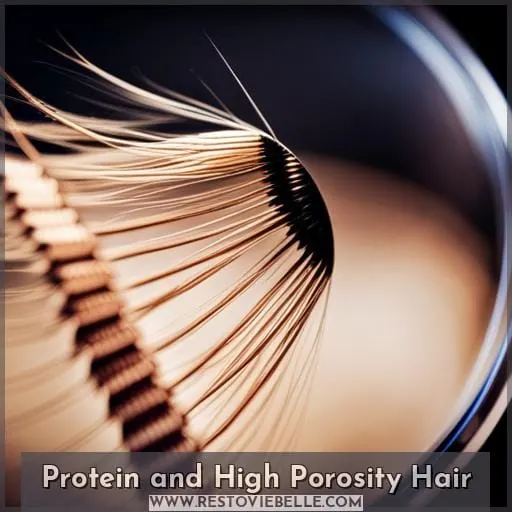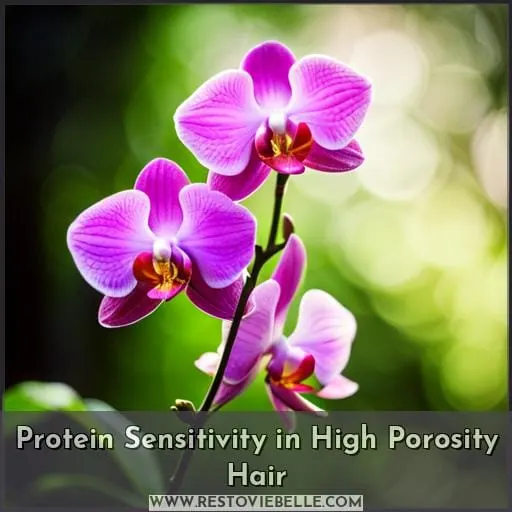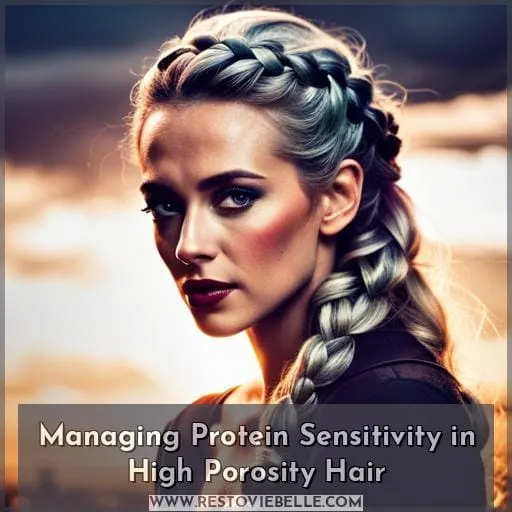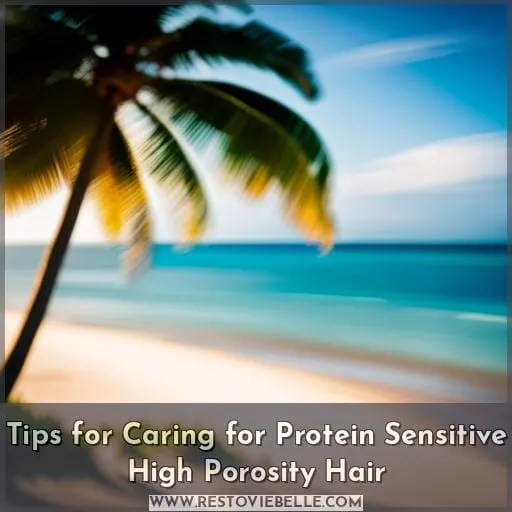This site is supported by our readers. We may earn a commission, at no cost to you, if you purchase through links.
 Imagine having high porosity hair, which means your hair strands absorb moisture quickly but struggle to retain it.
Imagine having high porosity hair, which means your hair strands absorb moisture quickly but struggle to retain it.
Yes, proteins play a crucial role in maintaining healthy and strong hair, but for some individuals with high porosity locks, too much protein can lead to stiffness and breakage.
In this article, we’ll delve into the relationship between high porosity hair and protein sensitivity to help you better understand and care for your unique tresses.
Table Of Contents
- Key Takeaways
- Understanding High Porosity Hair
- Protein and High Porosity Hair
- Protein Sensitivity in High Porosity Hair
- Managing Protein Sensitivity in High Porosity Hair
- Tips for Caring for Protein Sensitive High Porosity Hair
- Frequently Asked Questions (FAQs)
- Can high porosity hair be both protein sensitive and moisture sensitive?
- Are there any specific proteins that are more likely to cause sensitivity in high porosity hair?
- How can I determine if my high porosity hair is protein sensitive?
- Are there any alternative methods to strengthen high porosity hair without using protein treatments?
- What are some common signs of protein sensitivity in high porosity hair?
- Conclusion
Key Takeaways
- High porosity hair can be protein sensitive, leading to symptoms such as dryness, brittleness, and excessive shedding.
- Managing protein sensitivity in high porosity hair involves adjusting treatment frequency, exploring alternative protein sources, and balancing protein and moisture.
- Choosing the right products for protein-sensitive high porosity hair involves experimenting with different intervals between treatments and opting for protein-free options like aloe vera gel and coconut milk.
- Regularly assessing the condition of high porosity hair and practicing gentle hair care techniques are important for maintaining healthy hair.
Understanding High Porosity Hair
High porosity hair refers to hair that has a high level of cuticle damage, allowing moisture and products to easily enter and exit the hair shaft. It’s characterized by its inability to retain moisture, resulting in dryness, frizz, and breakage.
Understanding the definition and characteristics of high porosity hair is crucial in addressing its specific needs for protein treatments and maintaining overall hair health.
Definition and Characteristics of High Porosity Hair
If you have high porosity hair, it means that your hair has the ability to absorb and lose moisture quickly.
High porosity hair is characterized by raised cuticles, which allow moisture to enter easily but also escape rapidly.
This type of hair often feels dry and brittle due to its inability to retain moisture effectively.
However, high porosity hair can benefit greatly from protein treatments as proteins help strengthen and repair damaged strands.
Understanding the characteristics of high porosity hair is essential for managing protein sensitivity and maintaining healthy locks.
Causes of High Porosity Hair
Since you now understand the definition and characteristics of high porosity hair, it’s important to delve into the causes that contribute to this particular hair type.
High porosity hair can be caused by various factors such as:
- Heat damage
- Chemical processing
- Overuse of styling tools
- Environmental factors like sun exposure or harsh weather conditions
These external influences can weaken the hair cuticle and lead to increased porosity.
Identifying these causes is crucial in managing high porosity hair and selecting appropriate products for treatment and protection.
Common Issues With High Porosity Hair
Dealing with frizz and excessive moisture absorption are common issues faced by those with high porosity hair.
High porosity hair has a damaged cuticle layer, which allows for easy entry and exit of moisture.
Additionally, the damaged structure of high porosity hair makes it more prone to breakage and damage from heat styling tools or chemical treatments.
Managing these challenges requires a careful balance between protein benefits and sensitivity signs in order to maintain healthy, moisturized locks.
Protein and High Porosity Hair
Protein plays a crucial role in the health of high porosity hair.
As high porosity hair lacks sufficient protein, it often presents as weak and prone to breakage.
Incorporating protein into your hair care routine can help strengthen and fortify the strands, transforming dry and brittle hair into moisturized and resilient locks.
The Role of Protein in Hair Health
To understand the potential sensitivity of high porosity hair to protein, it’s important to explore the role that protein plays in maintaining overall hair health.
Protein benefits high porosity hair by providing strength and structure to weak strands. However, some individuals with high porosity hair may experience sensitivity signs such as dryness or brittleness when using protein products.
Finding the right treatment frequency and considering alternative sources of protein can help balance care for high porosity hair while ensuring its health and vitality.
Benefits of Protein for High Porosity Hair
Protein plays a crucial role in the health and care of high porosity hair, providing numerous benefits to improve its overall condition.
Protein helps strengthen the hair strands and restore their structure, making them less prone to breakage.
It also aids in maintaining moisture balance by sealing the cuticles, preventing excessive moisture loss.
Incorporating protein products into your routine can help enhance the strength and resilience of high porosity hair for healthier-looking locks.
How Protein Can Help Improve High Porosity Hair
If you have high porosity hair, incorporating protein into your hair care routine can significantly improve its health and resilience.
Protein benefits high porosity hair by strengthening the weak strands and restoring moisture balance.
Protein deep conditioners help replenish lost proteins in the hair shafts, making them more resilient to damage.
By selecting appropriate products that cater specifically to high porosity care, you can ensure that your protein-sensitive hair receives the right amount of nourishment for optimal results in maintaining a healthy protein and moisture balance.
Protein Sensitivity in High Porosity Hair
Protein sensitivity in high porosity hair is a common concern for many individuals.
Understanding what protein sensitivity entails and its signs and symptoms are crucial in determining if your high porosity hair is sensitive to protein.
By being knowledgeable about these factors, you can make informed decisions when it comes to incorporating protein treatments into your hair care routine, ensuring the best results for your unique needs.
What is Protein Sensitivity?
Experiencing protein sensitivity is a common concern for those with high porosity hair.
Protein sensitivity refers to the inability of the hair to properly absorb and utilize protein, leading to adverse effects on its health and appearance.
Symptoms of protein sensitivity in high porosity hair may include:
- Dryness
- Brittleness
- Excessive shedding or breakage
Proper management involves:
- Adjusting protein treatment frequency
- Selecting suitable products that are free from heavy proteins
- Incorporating regular deep conditioning for moisture balance
- Practicing protective styling techniques to minimize damage.
Signs and Symptoms of Protein Sensitivity in High Porosity Hair
If you have high porosity hair, you may notice certain signs and symptoms that indicate protein sensitivity in your hair.
These can include:
- Dryness
- Brittleness
- Excessive shedding or breakage
- A lack of elasticity
Your hair may feel rough or straw-like to the touch and have difficulty retaining moisture.
It’s important to identify these signs early on so that you can effectively manage protein sensitivity in your high porosity hair through:
- Adjusting protein treatment frequency
- Using protein-free products
- Practicing protective styling techniques
- Ensuring heat protection in your hair regimen.
How to Determine if Your High Porosity Hair is Protein Sensitive
To determine if your high porosity hair is protein sensitive, observe how it reacts to protein treatments and assess any changes in texture or overall condition.
Pay attention to signs of dryness, brittleness, or increased frizz after using protein products. If these symptoms worsen or persist over time, it may indicate a sensitivity to protein.
Experiment with different product selections and adjust your hair care routine accordingly to find the right balance between maintaining healthy levels of protein while managing symptoms of sensitivity.
Managing Protein Sensitivity in High Porosity Hair
When managing protein sensitivity in high porosity hair, there are several key points to consider.
Firstly, adjusting the frequency of protein treatments is crucial. High porosity hair may require less frequent protein treatments compared to other hair types due to its already weakened structure.
Secondly, exploring alternative sources of protein can be beneficial for those with sensitive high porosity hair. Instead of traditional animal-based proteins like keratin or collagen, plant-based proteins such as quinoa or rice can provide similar strengthening benefits without causing sensitivity reactions.
Lastly, finding the right balance between protein and moisture is essential in a high porosity hair care routine. Ensuring adequate hydration alongside targeted use of gentle proteins will help maintain optimal health and resilience for your strands.
Adjusting Protein Treatment Frequency for Protein Sensitivity
Adjusting your protein treatment frequency is essential for managing protein sensitivity in high porosity hair.
To maintain a healthy moisture balance, consider the following:
- Start with a lower frequency: Reduce the number of protein treatments to minimize potential sensitivities.
- Monitor your hair’s response: Pay attention to how your hair feels and looks after each treatment to determine if adjustments are needed.
- Find the right balance: Experiment with different intervals between treatments until you find what works best for maintaining strong, moisturized high porosity hair.
Alternative Protein Sources for Protein Sensitive High Porosity Hair
When managing protein sensitivity in high porosity hair, it’s important to explore alternative sources of protein.
Look for customized hair products that offer protein-free options specifically formulated for high porosity hair. These alternatives can help manage the effects of protein sensitivity while still providing the necessary nourishment and strength to your strands.
Additionally, incorporating heat protection into your routine can further protect your high porosity hair from damage during styling.
| Alternative Protein Sources | Protein-Free Options |
|---|---|
| Quinoa | Aloe Vera Gel |
| Hemp Seed | Marshmallow Root Extract |
| Flaxseed | Coconut Milk |
Balancing Protein and Moisture in High Porosity Hair Care Routine
To effectively manage protein sensitivity in high porosity hair, you need to find the right balance between protein and moisture in your hair care routine.
Here are four key points to consider when balancing protein and moisture:
- Pay attention to product selection, choosing ones that provide both protein and moisture.
- Determine the optimal treatment frequency based on your individual needs.
- Incorporate a moisture deep conditioner into your routine to replenish hydration.
- Regularly assess the condition of your high porosity hair and adjust accordingly for optimal results.
Tips for Caring for Protein Sensitive High Porosity Hair
When caring for protein sensitive high porosity hair, it’s important to choose the right hair products.
- Look for protein-free or low-protein options that won’t overwhelm your strands.
- Additionally, consider protective styling and heat protection to prevent further damage and breakage.
- Lastly, keep in mind other factors such as regular trims, gentle detangling techniques, and avoiding harsh chemicals that can exacerbate sensitivity in high porosity hair.
Choosing the Right Hair Products for Protein Sensitive High Porosity Hair
To care for your protein sensitive high porosity hair, it’s crucial to choose the right hair products.
When selecting products, focus on finding a balance between protein and moisture.
Look for protein-free options that provide hydration and nourishment without overwhelming your hair with additional proteins.
Pay attention to sensitivity signs such as dryness, brittleness, or excessive breakage when using certain products.
Additionally, consider incorporating protective styling and heat protection practices into your routine to minimize damage and maintain healthy high porosity hair.
Protective Styling and Heat Protection for Protein Sensitive High Porosity Hair
For effective care of protein sensitive high porosity hair, it’s essential to incorporate protective styling and heat protection into your routine.
Protective styling helps minimize manipulation and reduce breakage, while heat protection products create a barrier between your hair and hot tools to prevent damage.
When choosing protective styles, opt for low-manipulation options like braids or twists that don’t put too much stress on the hair.
Additionally, always use a heat protectant spray or serum before using any heated styling tools to maintain moisture balance in your protein sensitive high porosity hair.
Other Considerations for Protein Sensitive High Porosity Hair Care
When caring for protein sensitive high porosity hair, it’s important to:
- Regularly assess the needs of your hair and make adjustments accordingly.
- Maintain moisture balance.
- Select appropriate products with lower molecular weight proteins.
- Adjust treatment frequency based on your specific needs.
Additionally, implementing heat protection measures and incorporating protective styling can help minimize damage and maintain the health of your protein sensitive high porosity hair.
Frequently Asked Questions (FAQs)
Can high porosity hair be both protein sensitive and moisture sensitive?
Yes, high porosity hair can be both protein sensitive and moisture sensitive.
It’s important to find a balance between protein and moisture treatments to maintain the health and appearance of high porosity hair.
Are there any specific proteins that are more likely to cause sensitivity in high porosity hair?
Yes, there are specific proteins that can cause sensitivity in high porosity hair.
Proteins with larger molecular sizes, like hydrolyzed wheat protein or keratin amino acids, may be more likely to trigger a negative reaction in this hair type.
How can I determine if my high porosity hair is protein sensitive?
To determine if your high porosity hair is protein sensitive, pay attention to how it responds to protein treatments.
If it becomes stiff or brittle after using protein products, you may have a sensitivity and should adjust your hair care routine accordingly.
Are there any alternative methods to strengthen high porosity hair without using protein treatments?
Yes, there are alternative methods to strengthen high porosity hair without using protein treatments.
Deep conditioning with moisturizing products,
incorporating oils like argan or jojoba into your routine,
and minimizing heat styling can all help improve the health of your hair.
What are some common signs of protein sensitivity in high porosity hair?
Signs of protein sensitivity in high porosity hair include:
- Excessive dryness
- Brittleness
- Increased breakage
It may also feel stiff and lack elasticity.
Adjusting protein treatments or opting for alternative strengthening methods can help maintain hair health.
Conclusion
To sum it up, high porosity hair can indeed be protein sensitive, posing a unique challenge for individuals with this hair type.
While proteins are essential for healthy hair, excessive protein can cause stiffness and breakage in high porosity locks.
It’s important to balance protein and moisture in your hair care routine and be mindful of protein sensitivity signs.
By adjusting protein treatment frequency, exploring alternative protein sources, and choosing the right hair products, you can effectively manage and care for your protein sensitive high porosity hair.











